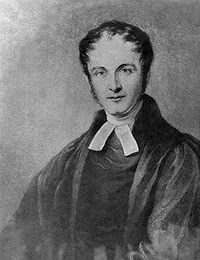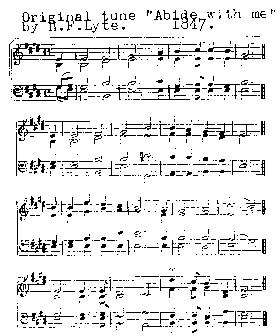 |
(1793-1847) Birth: June 1, 1793, Ednam, Scotland |
 |
(1793-1847) Birth: June 1, 1793, Ednam, Scotland |
EVELYNE MILLER
Henry Francis Lyte was born in the village of Ednam, near Kelso, in Scotland, on the 1st June 1793. He was the second son of Captain Thomas Lyte of the Royal Marines and his wife Anna Maria (nee Oliver). He had two brothers, Thomas and George.
In 1793 Britain was at war with Napoleonic France. In 1796 England was concerned about rumours of insurrection in Ireland and of a French force attempting to land in Bantry Bay to help the Irish rebels. In l798, the Irish rebellion had broken out and included among the troops sent from Britain to put down the rebellion was Capt. Thomas Lyte, who was drafted to Sligo. Anna Maria and their three sons followed later. Henry Francis had a very close relationship with his mother. In his early childhood she had told him of the love of God, taught him his prayers at her knee and read him stories from the Bible. Sadly the relationship between mother and son was to be short-lived. Thomas Lyte entered the two elder boys in The Royal School Enniskillen - now called Portora Royal School. Shortly afterwards, he abandoned his family and went to live in Jersey. Henry's brother, Thomas, may have gone with him, or, he may have stayed at school in Enniskillen. Either way, there is no record of him from this point on. Anna Maria and her son George went back to England where, after a short time, both died and Henry never knew what had happened to them. He found himself, at the age of nine, alone and without any means of support. This period in his life is pictured in the following poem.
Dr. Robert Burrows, the headmaster of Portora Royal School, a distinguished scholar and a Fellow of Trinity College, Dublin, was a very kindly family man. He had two sons and three daughters. He took compassion on the small boy and recognised his talent even at that early age. Dr. and Mrs Burrows took Lyte into their home and paid for his education in Portora. The world might have lost one of its finest poets and hymnologists, had it not been for the foresight of the Rev. Burrows. Lyte worked hard, showing early promise of his poetic ability. In 1809 at sixteen years of age he won a sizarship to Trinity College Dublin, which meant that he had to do menial tasks for the more well off students. He had intended entering Medical School, but felt called to the ministry and entered the Divinity School instead. He was a very handsome man, six feet tall, with dark curly hair and a pleasing personality. He was popular with his fellow students, and a brilliant scholar, but a very modest man. He was awarded the Chancellor's Prize for English Verse for three successive years. He was first among twenty four students in 1813 and in the same year he won a scholarship.
He was conferred with the B A Trinity degree in 1814.
He was ordained in 1815 and appointed as Curate to St. Munn's Church (Protestant) in Taghmon, where the Rector was the Reverend Simon Little. Lyte worked hard in his parish and at his parochial duties. He tutored the sons of an old friend, Thomas Bell (buried in Taghmon graveyard).
Lyte owed his education and comfortable home life to the generosity of Dr. and Mrs. Burrows, and now once again another Irish clergyman, the Reverend Abraham Swanne of Killurin Parish, a very devout pastor, was to have a great spiritual influence on his life. He attended the Reverend Swanne when he was critically ill, and the many deep spiritual discussions Lyte had with his dying friend and the courage and confidence Swanne had in his divine beliefs and faith made a lasting impression on young Henry Lyte and influenced him all the rest of his life and throughout his ministry. Although he ministered in the parish for only about three years he always looked back on Taghmon as a great milestone in his spiritual and pastoral life. (As remembered in conversations between the author and the late Lt Commander John Lyte Sedgwick RN a descendant of H. F. Lyte, a family connection.)

After Swanne's death Henry settled up the affairs of Mrs Swanne and her children, Gilbert and Elizabeth and attended to the parochial duties of Killurin parish until the appointment of a new rector. The Rev Swanne and Lyte must have had a lot in common as they were both ecumenically minded at a time when religious tolerance was at a low ebb. Swanne was buried in Killurin. Brian Cantwell describes Swannes memorial inscription:-
The mental and physical strain of looking after Swanne's affairs and parish, added to his own parochial duties was too much for Lyte's frail health and he developed lung trouble, which became so acute that his doctor told him he would have to go to a warmer climate and rest if he was to survive.
It is interesting to note that Lyte came to Ireland at the beginning of England's war with Napoleonic France, and that Waterloo had been won before he left Ireland. He held a Thanksgiving Service, in Taghmon, for the end of the war.
The credit for nurturing the genius of Lyte must go to Dr. Burrows and the Reverend Swanne. Portora is justly proud of its famous pupil and has placed a tablet to him in the school chapel:
A portrait of him hangs in the hall. They held a Service of Thanksgiving on his bicentenary and sang six of his hymns, including the full eight verses of Abide With Me (verses three, four and five are usually omitted).
Verse five "Thou on my head in early youth did smile," seems an obvious reference to his time in Portora. The Henry Francis Lyte Music Rooms in the school were named in his memory.
On his centenary a service of thanksgiving was held in Taghmon and a tablet was unveiled in his memory and on his bicentenary a thanksgiving service was also held in Taghmon:-
The format of the tablet is as follows:
After leaving Taghmon, he went to France and Italy to convalesce from his lung trouble, and when his health improved he moved to the parish of Marazion in Cornwall. There he met and married Anne Maxwell, daughter of Reverend William Maxwell of Monaghan. They were married in Bath, in 1818, and it was a very happy marriage. He returned to Trinity College, Dublin, in 1820 to receive his MA Degree. His father-in-law died shortly after the Lytes were married and left them a very welcome legacy which enabled them to live in reasonable comfort, as the stipend of a clergyman was very small. The legacy enabled Lyte to pay off his debt to Dr. William Burrows in full, which gave him great satisfaction.
His last parish was Brixham, on the south coast of England, where he was minister for twenty three years. He was greatly loved by his parishioners, mostly fishermen and their families. He took a great interest in their welfare and they looked forward to his many visits to their boats when they returned to harbour. He wrote a book of hymns and prayers for the sailors' use at sea, as well as the sea shanties that sailors love.
He was keen on the musical side of church worship and produced a metrical version of psalms and many hymns for church use including the well known "Praise my soul the King of Heaven," "God of Mercy God of Grace," "Sweet is the solemn voice that calls The Christian to the House of Prayer," "Pleasant are thy courts above" and many others. His parochial duties, his increasing literary writings and tutorial labours were a heavy burden. His health deteriorated and at the age of forty six he became extremely ill and had a period of intense suffering. He was warned again by his doctor that he must rest.
Mrs Anne Lyte was a great support to her husband, managing the household with great economy, helping in the parish with many local projects, visiting the sick and helping the poor. Her careful management of their finances enabled her husband to go abroad to avoid the cold, damp, English winters. The death of their infant daughter saddened them both. Lyte christened her Anna Maria after his mother, whom he had never forgotten. He spent long absences abroad every winter for health reasons, which were a great trial for his family. During his last serious illness he wrote the manuscript of his last hymn, "Abide With Me." Before going abroad he left a copy of the words and the music, which he composed for the hymn, with his daughter, but took the manuscript away with him for more revision. He sent the finished manuscript to his wife, from Avignon. He knew that it was very unlikely that he would ever return home. On reaching Nice he became very ill and died there on the twentieth of November 1847, in the Hotel de Angleterre. It was fitting, that as he was dying, he was attended by another clergyman, the Reverend Manning, Archdeacon of Chichester, who happened to be staying in the same hotel. He was buried in the English Cemetery of the Holy Trinity Church, in Nice, on 22nd November. A white cross, standing on a flat slab, marks his grave and the memorial reads:-

A large church has been rebuilt in Brixham and dedicated to H.F. Lyte. In the church is a tablet:
When the sad news of his death reached Brixham the fishermen asked Lyte's son-in-law, who was curate in Brixham, to hold a memorial service and at that service "Abide With Me" was sung for the first time, and to the original tune composed by Lyte. It was a fitting requiem for Henry Francis Lyte. In 1952 a plaque was placed on the bridge over Eden Water, that runs through the village of Ednam, to commemorate " Henry Francis Lyte., author of Abide With Me, who was born in a nearby house." On the centenary of his birth an alabaster tablet, in memory of Lyte, was placed in Westminster Abbey. It was unveiled by his eldest great-grandson, Major Maxwell Lyte
"Eventide" by Monk is the tune that the hymn "Abide With Me" is usually sung to today, and Lyte's tune is seldom used. The famous contralto, Dame Clara Butt (1872 - 1936), sang the hymn in Westminster Abbey. She nearly always ended her recitals with it and it was my good fortune to have heard her singing it in Bristol, in the early 1930s. I shall never forget that rich and powerful voice singing the wonderful words with such feeling. It was an unique experience and a very emotional one to hear the greatest soloist of her time singing this hymn at the "Eventide" of her career.
